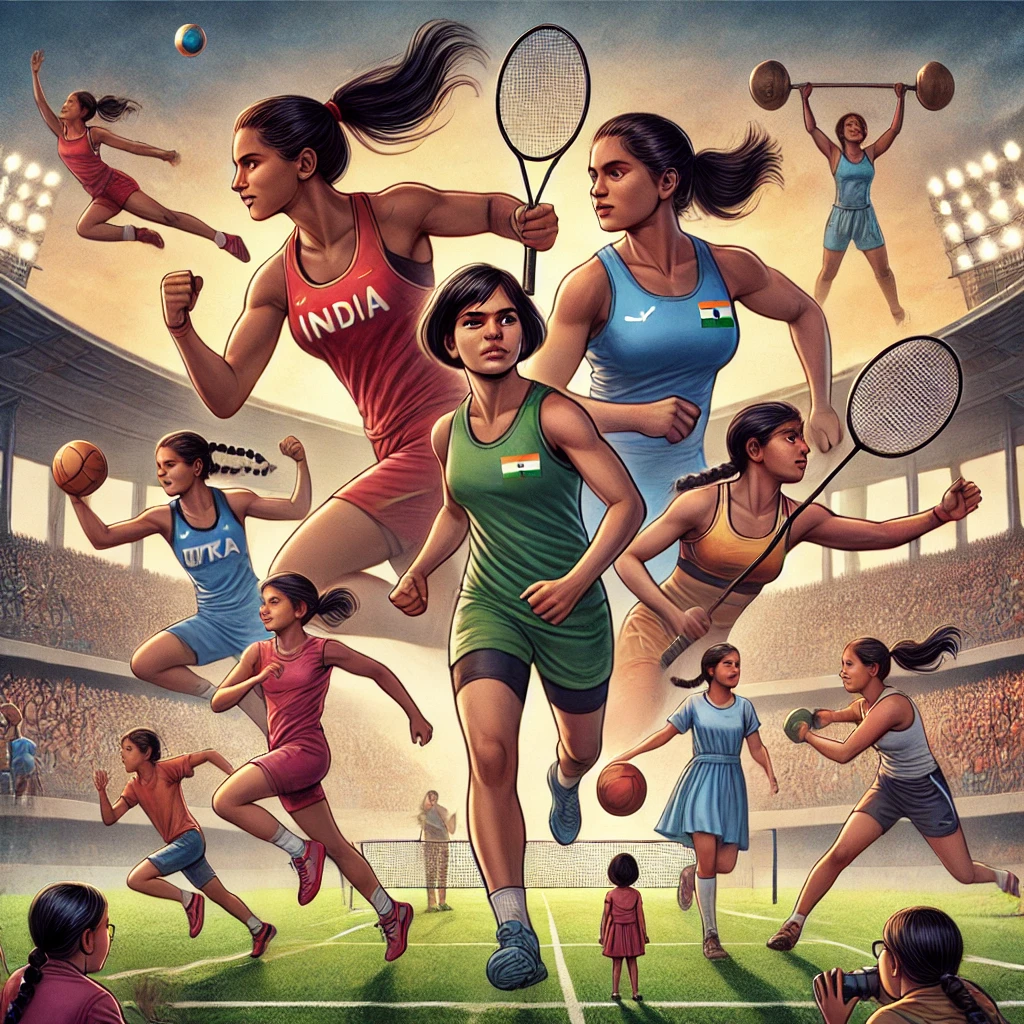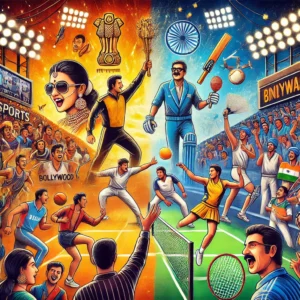In recent years, Indian female athletes have emerged as powerful symbols of determination, resilience, and excellence, significantly impacting the country’s sports culture. Their achievements on both national and international stages have challenged long-standing gender norms and provided a platform for societal change. By breaking through barriers and excelling in fields traditionally dominated by men, these athletes have become role models for millions of young girls across India. They embody the message that success in sports is not bound by gender, inspiring a new generation to dream big and pursue their passions. Beyond just winning medals, their stories of struggle, perseverance, and ultimate triumph have sparked a broader conversation about the importance of gender equality in sports and society. As more Indian women step into the spotlight in various athletic disciplines, they pave the way for a future where sports can be a platform for empowerment, unity, and pride for all.
The Emergence of Indian Female Athletes on the Global Stage
The rise of Indian female athletes on the global stage has been a remarkable journey, marked by both personal struggles and significant victories. These athletes have defied societal expectations and set new benchmarks for success in sports that were once considered out of reach for women. Their participation and achievements in international competitions have not only put India on the global sports map but have also inspired a generation of young women to follow in their footsteps.
Breaking Barriers in Traditionally Male-Dominated Sports
Many Indian female athletes have made their mark in sports where women’s participation was previously limited. For example, sports like wrestling and boxing, which have traditionally been male-dominated, have seen Indian women rise to prominence. Wrestlers like Vinesh Phogat and Sakshi Malik, along with boxer Mary Kom, have become household names, proving that with hard work and determination, women can excel in any sport. Their successes have challenged stereotypes and changed the narrative around what women in India can achieve.
Notable Achievements in International Competitions
Indian female athletes have achieved significant milestones in various global events, such as the Olympics, World Championships, and Commonwealth Games. PV Sindhu’s historic silver medal at the 2016 Rio Olympics and bronze at Tokyo 2020 in badminton brought global recognition to Indian women’s badminton. Similarly, Hima Das made headlines by becoming the first Indian woman to win a gold medal in a global track event at the IAAF World U20 Championships. These achievements have demonstrated that Indian women can compete at the highest levels and have paved the way for future athletes.
The Role of Media in Promoting Female Athletes
The media has played a crucial role in bringing the stories of these athletes to the forefront, highlighting their struggles and triumphs. Films like “Dangal,” which tells the story of the Phogat sisters, and “Mary Kom,” based on the life of the legendary boxer, have popularized the journey of female athletes in India, reaching audiences beyond the sports community. Media coverage of their successes has created a greater appreciation for women’s sports, encouraging more young girls to take up athletics as a viable career path. This visibility has also helped attract sponsorships and support, making it easier for female athletes to access the resources they need to excel.
The emergence of Indian female athletes on the global stage is more than just a series of wins and records; it represents a shift in cultural attitudes towards women in sports. Their achievements have helped create a more inclusive environment where talent and dedication are recognized, regardless of gender, setting the stage for future generations of female athletes to thrive.
Iconic Indian Female Athletes Who Inspire
The stories of iconic Indian female athletes have become a source of inspiration for millions, showcasing the heights that can be achieved through hard work and determination. These athletes have made significant contributions to their respective sports, bringing glory to the nation and proving that with dedication, any challenge can be overcome.
1. PV Sindhu – Badminton and Breaking Records
PV Sindhu is one of India’s most celebrated badminton players, known for her resilience and skill on the court. She became the first Indian woman to win a silver medal in badminton at the Olympics and continued her legacy with a bronze at the Tokyo 2020 Games. Her achievements have made her a role model for aspiring badminton players across the country.
2. Mary Kom – Boxing and Resilience
Mary Kom, also known as “Magnificent Mary,” has made a name for herself as a six-time world champion in boxing. Despite coming from a small village in Manipur and facing numerous challenges, she has become a symbol of strength and perseverance. Her story has inspired many young girls to take up boxing, a sport that was previously considered unconventional for women in India.
3. Dutee Chand – Sprinting and LGBTQ+ Representation
Dutee Chand is a trailblazer in Indian athletics, known for her speed and courage. As the first openly LGBTQ+ athlete from India, Dutee has not only excelled on the track but has also broken barriers for inclusivity in sports. Her achievements in sprinting have made her a source of pride and inspiration for marginalized communities.
These athletes, along with many others like Mithali Raj in cricket and Hima Das in athletics, have shown that with determination and support, Indian women can reach the pinnacle of success in sports, inspiring future generations to pursue their dreams.
The Challenges Faced by Female Athletes in India
Despite their remarkable achievements, Indian female athletes face numerous challenges that can hinder their progress and limit their potential. Addressing these challenges is crucial for ensuring that more women can succeed in sports and inspire future generations.
- Gender Bias and Societal Expectations: One of the most significant challenges faced by female athletes in India is societal bias. Many women are discouraged from pursuing sports, as they are expected to prioritize family responsibilities or traditional roles. This mindset often leads to a lack of support from families and communities, making it harder for female athletes to focus on their training and careers. Overcoming these societal expectations requires a cultural shift that values women’s participation in sports as much as men’s.
- Lack of Infrastructure and Training Facilities: Access to quality training facilities is another major hurdle for many aspiring female athletes. While urban centers may offer better facilities, many talented athletes come from rural areas where sports infrastructure is limited. The absence of proper training grounds, equipment, and coaching can restrict the development of these athletes, preventing them from reaching their full potential. Investing in grassroots sports development is essential to address this gap.
- Financial Support and Sponsorship Issues: Securing financial support and sponsorship is often a challenge for female athletes, especially in sports that do not receive widespread media attention. Male athletes, particularly in popular sports like cricket, tend to attract more sponsors and endorsements, leaving female athletes with fewer resources. This disparity can affect their ability to travel for competitions, access advanced training, and focus solely on their sport. Equal opportunities for sponsorships and financial support are needed to level the playing field.
- Balancing Career and Personal Life: Many female athletes face the challenge of balancing their sports careers with personal and family responsibilities. The pressure to conform to societal norms around marriage and family life can force women to make difficult choices between their personal aspirations and their sports careers. This struggle is especially pronounced for athletes who become mothers, as they often face additional scrutiny and limited support for continuing their careers.
Addressing these challenges requires a collective effort from society, sports federations, and the government to create an environment where female athletes can thrive. By providing equal opportunities, better facilities, and societal support, India can ensure that more women are able to pursue their dreams in sports.
The Positive Impact of Female Athletes on Future Generations
The achievements of Indian female athletes have had a profound impact on future generations, inspiring more girls to pursue sports and changing societal attitudes towards women in athletics.
- Encouraging More Girls to Pursue Sports: The visibility of successful female athletes in India has inspired countless young girls to take up sports. Seeing athletes like PV Sindhu, Mary Kom, and Hima Das excel on international stages sends a powerful message that girls can achieve greatness in any field. This encouragement has led to an increase in participation rates among girls in sports academies and schools, fostering a new wave of talent.
- Shifting Societal Perceptions About Women in Sports: The success of female athletes has helped challenge traditional gender roles in Indian society. Their stories of hard work, resilience, and triumph have shifted perceptions, showing that women are capable of excelling in competitive environments. As a result, there is a growing acceptance of women’s involvement in sports, leading to a more inclusive and supportive environment.
- Role Models for Empowerment and Confidence-Building: Female athletes serve as role models for young women, providing them with examples of strength, discipline, and confidence. These athletes prove that it is possible to break barriers and succeed against the odds. Their stories of overcoming challenges resonate with young girls, giving them the confidence to pursue their own goals, whether in sports or other fields.
- Promoting Diversity and Inclusion in Sports: The success of athletes like Dutee Chand, who represents the LGBTQ+ community, has also highlighted the importance of diversity and inclusion in sports. This representation encourages people from all backgrounds to participate in athletics, promoting a culture where everyone has the opportunity to compete and succeed.
The positive impact of Indian female athletes on future generations is a testament to their resilience and determination. Their stories inspire a new generation of athletes, paving the way for a brighter and more inclusive future in Indian sports.
The Future of Women’s Sports in India
The future of women’s sports in India holds great promise, as more efforts are being made to support female athletes and promote gender equality in sports. With increasing investment in infrastructure, the establishment of grassroots programs, and greater media attention, women’s sports are poised for growth in the coming years.
To ensure sustained progress, it is crucial to continue addressing the challenges faced by female athletes, such as improving access to quality training facilities and providing equal opportunities for sponsorships. Additionally, promoting sports at the school level and encouraging more families to support their daughters’ athletic pursuits will help create a strong pipeline of future talent.
The rise of digital platforms has also opened up new avenues for promoting women’s sports, allowing athletes to share their stories directly with audiences and attract new fans. As more female athletes become household names, they will continue to inspire the next generation to dream big and achieve their goals.
In conclusion, the achievements of India’s female athletes are not just victories in the arena—they are milestones that are shaping a more inclusive and empowered society. With the right support and opportunities, the future of women’s sports in India is set to shine even brighter, paving the way for generations of athletes to come.
Title:
“Rising Indian Female Athletes 🌟 Inspiring Future Generations” (61 символ)
Description:
“Learn how rising Indian female athletes 🌟 are breaking barriers and inspiring future generations with their achievements and dedication.” (151 символ)



